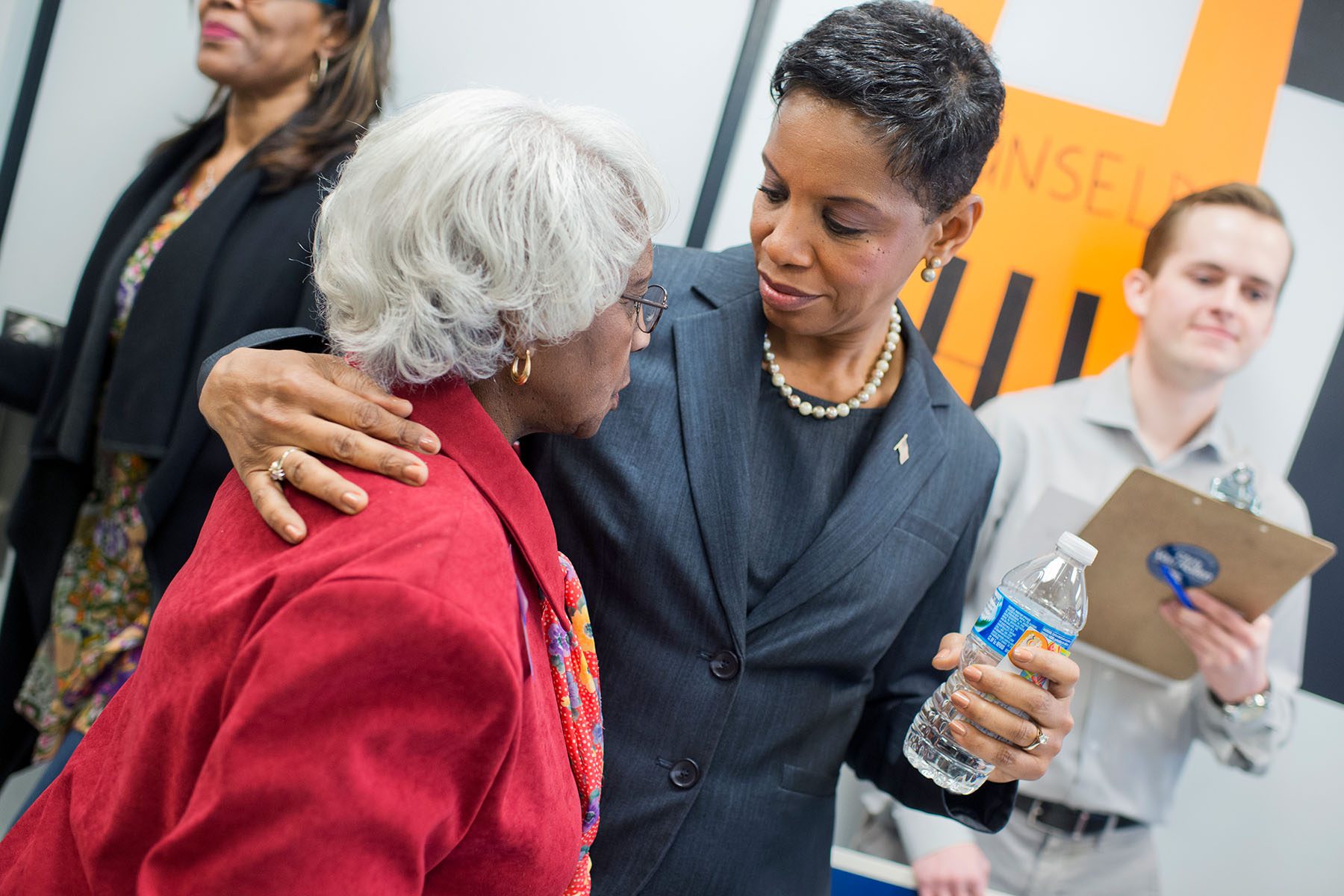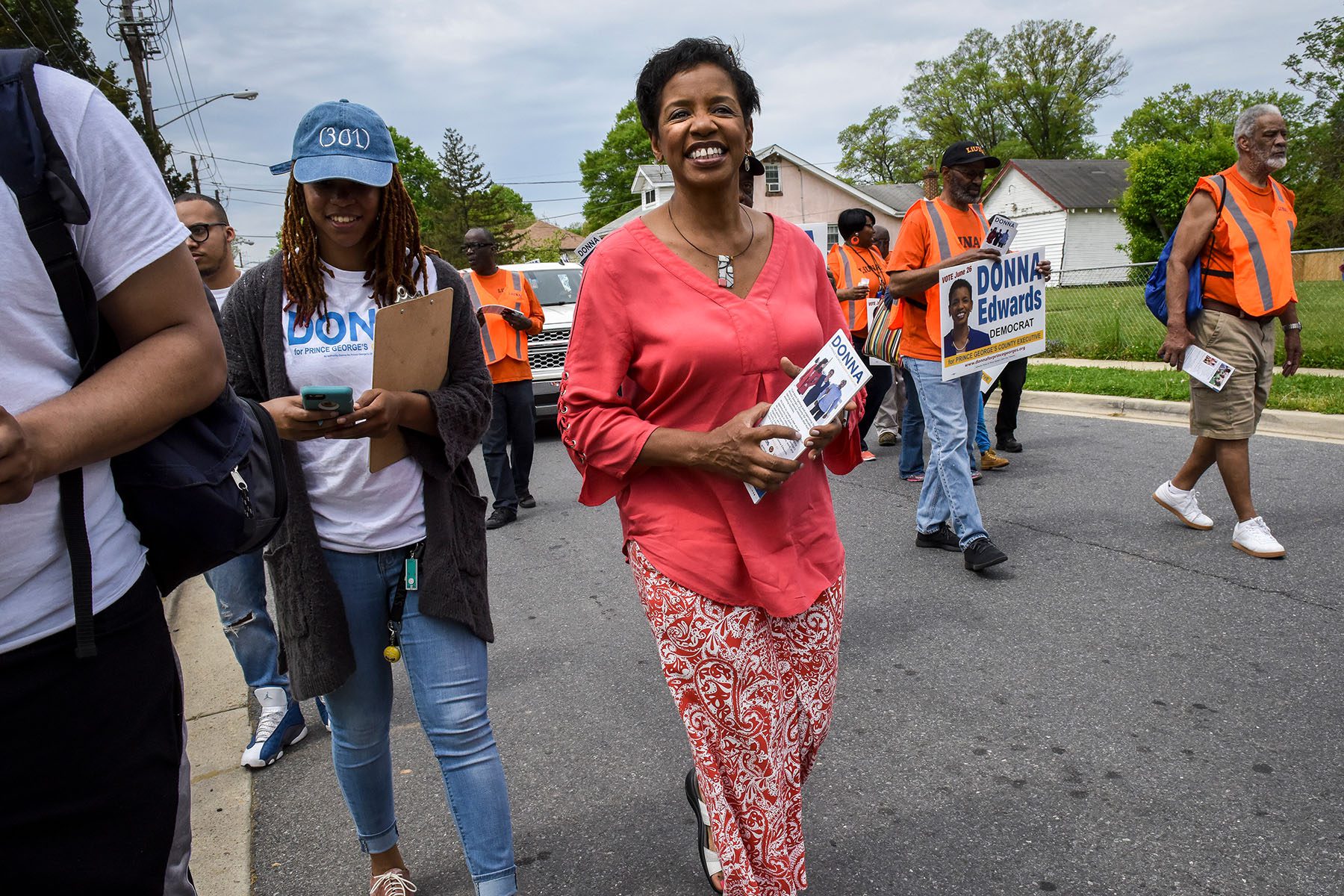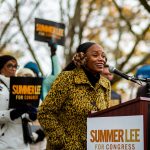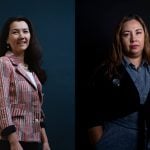Donna Edwards was in her fifth term representing Maryland’s 4th Congressional District in 2015 when longtime Sen. Barbara Mikulski announced that she would retire. Edwards decided to launch a bid to replace her in the upper chamber, believing the “Senate could use the kind of diversity we have in the House.”
At the time, just one Black woman had served in the Senate: Carol Moseley Braun, a Democrat from Illinois, from 1993 to 1999. Edwards was vying to be the second. (Vice President Kamala Harris was elected in 2016 to represent California and served from 2017 to 2021.)
Edwards lost in the Democratic primary to now-Sen. Chris Van Hollen, another longtime House member and prolific fundraiser with stature in the Democratic Party. So she spent the summer and autumn as she finished her term “on the road, literally every single weekend, in swing states, working to help get Hillary Clinton elected,” she recalled in a recent interview with The 19th.
When Donald Trump won instead, Edwards hit the road again ahead of his inauguration — this time, by herself in a recreational vehicle named Lucille, visiting parks and diners to learn more about the country and its people.
“On January 5, I think it was, I got in an RV and started driving around the country — something that I always wanted to do. I thought I might be gone for a couple of weeks. And that couple of weeks ended up being about 3 1/2 months, visiting every state that you can imagine throughout the South and the central part of the country in the Midwest, and all the way to the west to the West Coast,” said Edwards, who estimated she logged about 12,500 miles.
“It gave me an opportunity to see the country in a different way, to have conversations with people who I would not have had conversations with in the bubble of the Washington, D.C., metropolitan area,” she added.
Edwards is back on the ballot this year to again represent Maryland’s 4th Congressional District. It was recently redrawn to include less of Montgomery County and more of Prince George’s County, which has some of the highest concentrations of Black wealth in the country.
It’s one of the safest Democratic districts in the country, so whoever prevails in the July 19 primary is all but sure to win in November. State lawmaker Jazz Lewis, a mentee of House Majority Leader Steny Hoyer of Maryland, recently exited the Democratic primary. The front-runners are now thought to be Edwards and former prosecutor Glenn Ivey, though no polling has been done in the race.
Edwards said that after she lost the Senate bid and finished her House term as a Republican administration took over Washington, she “wasn’t sure that I’d ever hold elective office again.” But she didn’t stray too far from politics.
Mileah Kromer, a political science professor at Goucher College, said that name identification matters — and both Edwards and Ivey have it. But the district, part of the Washington suburbs, is also “an area where meeting and greeting the average voter matters.”
“The voters want to see you, and they want to see you in person,” she said.
Edwards began her career as a Lockheed Martin contractor at NASA’s Goddard Space Flight Center in Greenbelt, Maryland, which is now fully in the redrawn district. After law school, she clerked for then-state lawmaker Albert Wynn, who went on to represent Maryland’s 4th District in the House until Edwards beat him in the 2008 primary. In the 1990s, Edwards co-founded the National Network to End Domestic Violence, which worked with then-Senator and now President Joe Biden to pass the Violence Against Women Act.
After leaving Congress and going on her cross-country tour, Edwards said, she “jumped right into roles at NBC and MSNBC, and for a little bit of time at Fox News” as a political commentator and wrote a column for The Washington Post. “I never transitioned out of being concerned about public policy and promoting progressive public policy,” she said.

In 2017, Edwards was diagnosed with multiple sclerosis. She talked about her diagnosis with voters in Texas, Kansas and elsewhere and used her platform to advocate for affordable health care. In 2018, she competed in the Democratic primary to be Prince George’s County executive but lost. Then, when Rep. Anthony Brown, who was elected to represent the 4th District in 2016, announced that he would leave the House to run for attorney general of Maryland, Edwards said that she couldn’t pass up the chance to regain her old seat.
Research done by the Barbara Lee Family Foundation, which supports women’s participation in politics, shows that voters reject the idea that women candidates should not try again after an electoral loss. Kromer noted that Edwards has “made an effort, since the losses, to maintain a public profile” via her television appearances.
As Edwards sees it, she brings the experience of a longtime incumbent, along with the fresh perspective of spending the past five years outside the congressional bubble.
Edwards would return to the House with seniority in terms of committee assignments. She previously served on the Science, Space and Technology and the Transportation and Infrastructure panels and said the purviews of both are critical to the district. Goddard is doing work on earth science, which is “the basis for which we make determinations about policies around climate change.” Plus, “in the Washington metropolitan area, our lives are governed by traffic, and by access to public transportation,” she said.
Edwards was previously a member of the Congressional Progressive Caucus, which has expanded its ranks in the years since. Current Chair Rep. Pramila Jayapal of Washington has endorsed Edwards, as have several other caucus members.
Edwards grew up in a military family, and they “criss-crossed the country, going from one installation to the next.” When her son was younger, a “really cheap vacation was throwing the tents in the back of the car and driving.” But her most recent trip — alone, after having served in Congress, and on a mission to understand the 2016 election — hit a bit differently.
She would stop in diners and talk to people in small towns dominated by boarded-up storefronts. As debate about Trump’s proposed border wall raged, she drove on U.S. Highway 90 along the Texas-Mexico border and thought about “what a ridiculous idea that was, and how it wasn’t a public policy, it was a public pronouncement.” She visited Theodore Roosevelt National Park in North Dakota and reflected on the president who oversaw the establishment of five national parks, and set aside more than 100 million acres for national forests.
“The vastness of the United States is something that people should see — the beauty, and the differences in regions and in cultures across the United States makes one reflect on the amazing experiment of this republic, and through all that vastness and difference, that we’re united under one flag,” Edwards said.







